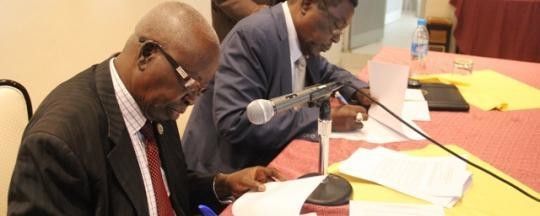The head of the Jieng (Dinka) Council of Elders, a group of influential Dinka politicians and close relatives and allies of the South Sudanese president, denied on Thursday that their activities during the past 20 months of conflict were against peaceful resolution of the war.
Ambrose Riny Thiik, president of the tribal leadership group, says they were “never against peace.”
“I would like to make this clear because it seems our genuine calls for peaceful resolution of the conflict have been misinterpreted and politicised. The council was never against peace. It was advocating for an all-inclusive and holistic approach to ending the conflict, which the mediation did not pay attention to it,” said Ambrose.
“The mediation process from the very beginning did not give the parties to the conflict an opportunity to sit down themselves and discuss issues which caused the conflict and to address them in a meaningful way,” added the leader of the tribal group.
However, Ambrose is warning that the current IGAD peace deal may succeed in temporarily halting the fighting but does not prevent possible resumption of the war in the very near future.
“The agreement is full of loopholes because it was crafted particularly in favour of one of the parties to the conflict and placed IGAD at the centre of the decision-making mechanism.”
“The powers of the elected president have been removed from him and made someone who was not elected as a co-president. If you read the agreement carefully, you will miss that it makes Riek Machar co-president, not just a vice president and the agreement essentially renders the sitting president powerless and more ceremonial. These were the issues which the council pointed out as we see them as source of potential conflict,” he said.
These remarks echo the Council of Elders’ position paper dated 31 July 2015.
Accusations against Ambrose Riny Thiik
The Jieng Council of Elders played a role in advising Salva Kiir privately during the war and also issued several public statements, including one slamming the proposed compromise agreement as a foreign plot to take over the country.
The position paper signed by Ambrose rejected demilitarization of Juba, rejected mandated reforms of the army, and criticized plans to make Riek Machar first vice president. The paper raised fears that the peace agreement would render Salva Kiir powerless and make his rival ‘co-president’.
Ambrose Riny Thiik also lashed out at the AU Commission of Inquiry in his July position paper, saying that IGAD’s peace proposal was “born out of the recommendations of the African Union Commission report, which recommended foreign personalities to run the country during the transitional period.”
His criticism of the Commission of Inquiry comes after AU investigators recorded allegations that Ambrose Riny Thiik himself participated in raising a private militia accused of perpetrating massacres in Juba, the “Dut ku Beny”.
A document leaked from within the AU Commission last year quotes a top SPLA general as saying that Ambrose helped lead pre-war efforts to mobilize the private militia, also known as ‘Mathiang Anyoor.’
“He explained the background to the killing: ‘Secret mobilization had happened before this that we [the army] were not aware of. It started earlier in November. Elders met and chose mobilizers at this meeting, to protect the president [Dut ku Beny],” reads the leaked AU document.
“The meeting was chaired by former Chief Justice, Ambrose Riing Thiik.”
Photo: Justice Ambrose Riny Thiik (left), a leading figure in the ‘Jieng Council of Elders’
Related:
Generals say Juba massacres done by private militia, not SPLA




